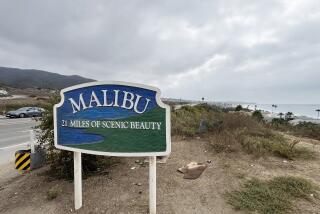Reports of Heart Attacks Increase; 4 People Die
- Share via
An early morning conference of doctors was in progress at Cedars-Sinai Medical Center on Thursday when the hospital building started to rock dramatically. Minutes later, many of the doctor’s beepers began going off. Patients all over the hospital were experiencing chest pains and palpitations.
“Physicians scattered to their respective areas to check on their patients,” said Dr. Judith Miller, a medical intern. “Most of the patients were OK. They just needed reassurance.”
At homes and hospitals throughout Los Angeles, there were dozens of reports of people suffering heart-related pains and other frightening medical symptoms Thursday. In the five hours after the earthquake, for example, city Fire Department paramedics received 46 calls to respond to what appeared to be heart attacks, described by Fire Chief Donald O. Manning as much higher than usual.
Quake-Related Fatalities
There were four reports of quake-related heart fatalities.
In Los Angeles, a 69-year-old man suffered a fatal heart attack while being evacuated from a high-rise building at 3460 Wilshire Blvd. In Bell, a 72-year-old woman collapsed and died at her apartment at 6206 Heliotrope Ave.
In South El Monte, a man in his 50s was found dead in a building in the 2100 block of Rosemead Boulevard by county firefighters who said they believed his death was due to a heart attack that occurred about the time of the quake.
Identities of the three victims were withheld pending notification of relatives.
In Irvine, Mardella Finch Smith, a 69-year-old woman with a history of heart trouble, collapsed and died while talking on the telephone with her husband about the earthquake, police said.
But it was difficult to immediately sort out how many of the other heart attack reports were earthquake-related. In part, this is because each day in Los Angeles County about 140 people suffer heart attacks, about 50 of which are fatal. About 15 people suffer fatal strokes.
Study After Athens Quake
One of the few scientific studies to assess the risk of fatal heart attacks was done by researchers at the University of Athens, Greece, Medical School after an earthquake in Athens that measured 6.7 on the Richter scale on Feb. 24, 1981.
The study found that quake-related stress contributed to an increased number of deaths from cardiac causes on the days after the tremor, compared to deaths during the surrounding month and the corresponding periods of 1981 and 1982.
In the three days after the quake, there were 20 deaths from diseases of the heart arteries in the Athens metropolitan area of 3 million people, according to a 1983 report of the study in The Lancet, a British medical journal. By comparison about half that number of such deaths would have been expected if the quake had not occurred.
Death by Fright Debated
Most of the earthquake-related sudden cardiac deaths occurred in people with a history of heart disease.
Physicians have debated for years whether it is possible to actually die of fright.
An acute psychological stress, such as an earthquake, could trigger hormonal changes that can cause fatal heart rhythms, according to Dr. Howard N. Allen, the Cedars-Sinai cardiologist who is president of the American Heart Assn.’s Greater Los Angeles affiliate. Hormonal changes could also interfere with the blood supply to the heart and trigger a potentially fatal heart attack.
Symptoms Misleading
But the symptoms of heart diseases, such as chest pains, difficulty in breathing, and fainting, also can match symptoms of many other ailments. These range from serious illnesses such as lung infections and perforated ulcers to less threatening conditions such as muscle injury, hyperventilation and simple anxiety.
As a result, it often takes physicians hours to days to determine with certainty whether an individual with heart-related symptoms is experiencing heart problems or something else.
“Probably a large number of the people who experienced symptoms of chest pain and palpitations today had symptoms secondary to anxiety associated with the earthquake that had nothing to do with underlying heart disease,” Allen said.
More to Read
Sign up for Essential California
The most important California stories and recommendations in your inbox every morning.
You may occasionally receive promotional content from the Los Angeles Times.










